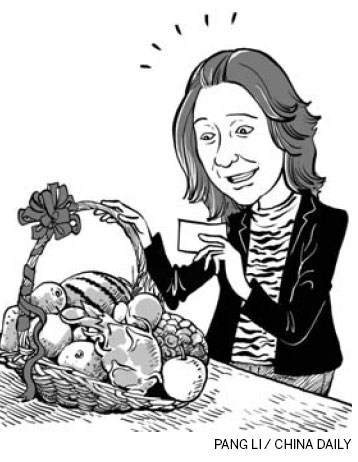Why re-gifting is the present that improves relationships
Updated: 2011-11-23 08:08
By James Ritchie (China Daily)
|
|||||||||
When choosing gifts for friends and relatives before a recent trip back to China, my wife played a game of figuring out whom the recipients would end up giving them to.
 |
Her cousin would likely pass the facial moisturizer to an in-law. Her aunt would present the black leather shoes to her son's girlfriend. Her uncle would give the nice bottle of whiskey to his boss.
In the United States, where we live, re-gifting is often considered bad form. It can suggest that the present was not liked, or that the re-gifter is too cheap to buy anything.
 |
Among my in-laws and friends in China, however, gifts bounce from person to person like a jianzi, the feathered, Middle Kingdom version of a hacky sack. No one seems to get offended.
It isn't that people don't like the presents. Rather, in many cases, the items are simply more valuable for building guanxi, or goodwill among your social network, than for personal use.
I once received a Starbucks gift card from my boss for Christmas. My wife was perturbed when I promptly used it to buy a cup of coffee.
The card, it seems, would have made the perfect gift for one of her friends. Maybe someday we would need the friend to give us a lift to the airport or help us move. Then we'd be glad we sacrificed our own caffeine kick in favor of generosity.
I'd wasted a perfectly good guanxi ticket.
There's also the matter of practicality.
Gift giving gets expensive, especially during holidays, such as the Lunar New Year, when families get together and people exchange stuff of roughly equal value.
They operate by the principle of "li shang wang lai", meaning reciprocity or "if someone gives you a gift, you'd better come up with something in return".
The goodies tend to be cigarettes, alcohol, fruits and other food items, often ornately boxed and wrapped in gold foil paper. The fancier it looks, the better, as that means more face for the recipient.
In fact, "it's not unusual for a gift's wrapping to cost more than the gift itself", Sam Goodman writes in Where East Eats West, a book about doing business in China.
In part to control costs, you take the presents that one branch of your family gave you and give them to members of another branch. A few years ago, my wife got her own fruit basket back.
Long, winding journeys for these generic offerings are common throughout China, a journalist friend in Beijing told me.
"We just think it's funny," she said.
"It's what we do every year."
Of course, Americans re-gift, too.
A poll of New Jersey residents by Fairleigh Dickinson University found 38 percent of respondents said they engaged in the practice. An equal number said they disliked the custom.
The most common reason for giving away a present: They thought the gift would be more suitable for someone else. Re-gifting can also be good for the environment, since it's a form of recycling.
Even in China, though, not every gift is a suitable candidate for re-gifting.
"For birthdays and the like, you might give a gift from the heart, more similar to gift giving in the West," the journalist said.
"It represents your kindness and friendship, and you'd write some words with the gift. Turning around and giving this to someone else would be rude."
The bounty that overseas Chinese bring home for family and friends on visits straddles the line between the two types of presents.
Americans might say these are gifts from the heart. Choosing, buying and packing them is, after all, one of the most stressful aspects of preparing for a trip home.
But in my experience, in order for an item to be off limits for re-gifting in China, it had better be quite personalized.
In fact, you might want to get it monogrammed.











